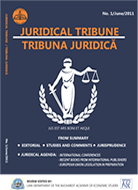State formation and recognition in international law
State formation and recognition in international law
Author(s): Anthony Matthew Dima Murphy, Vlad StăncescuSubject(s): Law, Constitution, Jurisprudence
Published by: Societatea de Stiinte Juridice si Administrative
Keywords: State recognition; Montevideo Convention; declarative theory; constitutive theory; international law;
Summary/Abstract: The following study intends to analyse the evolution of theories regarding the recognition of states in international law. Whereas the Montevideo Criteria contains the legal requirements for statehood, recognition is largely dependent on the political will of the other states. The question faced by the contemporary international community is whether a state is held to recognise another if it meets the said requirements. While the Constitutive Theory insists that a state could only exist as an international legal person if it is recognised by previously-established states, the Declarative Theory rejects such a discretionary process. While the common practice among states was argued to be somewhere in the middle of these two theories, the declarative conception is much closer to the current model followed by the international community as it is also enshrined in the rules contained in the Montevideo Convention and reiterated by the Badinter Commission.
Journal: Tribuna Juridică
- Issue Year: 7/2017
- Issue No: 13
- Page Range: 6-14
- Page Count: 9
- Language: English

